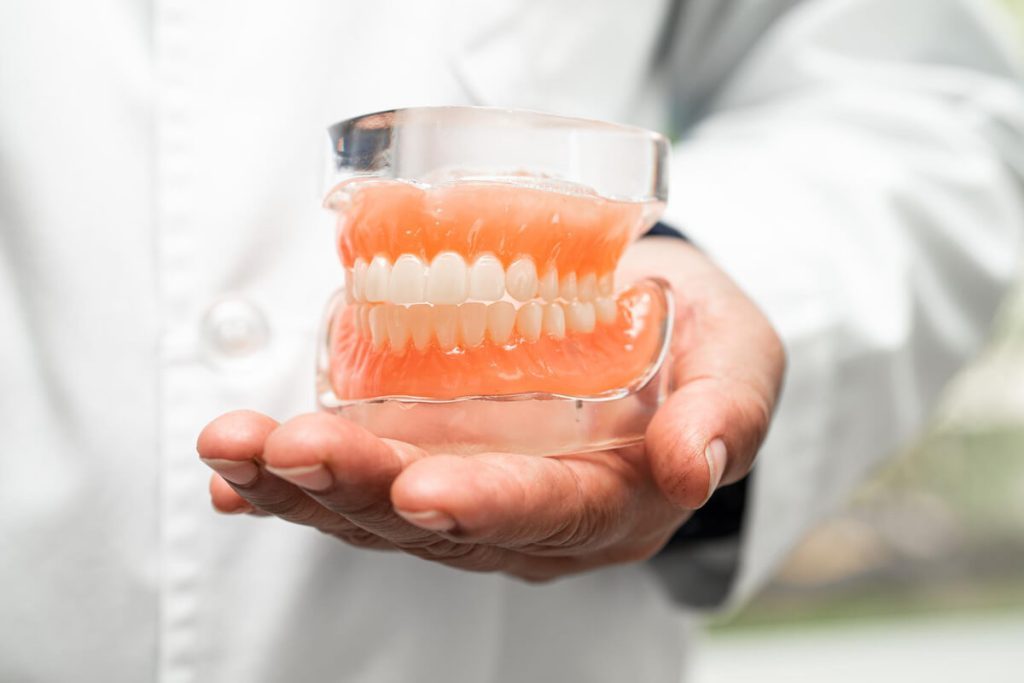Denture Pros And Cons — Weighing Up Your Options

Dentures are one of the oldest forms of teeth replacement, but they’ve gotten quite a bad rap over the years. You might remember an elderly relative struggling with their dentures.
Modern dentures are affordable, more comfortable, and natural-looking than their predecessors.
For these reasons, dentures remain a popular choice. But if you are still unsure whether wearing dentures is right for you, we’re here to help.
In this post, we’ll discuss dentures’ pros and cons so you can make an informed decision.
The Pros of Wearing Dentures
Affordability
Dentures are affordable compared to other forms of teeth replacement, like dental implants.
Low-cost dentures can be between one-third and half the cost of a single dental implant. Even for high-quality upper and lower dentures, you will likely pay just a little more than a single tooth implant.
Non-surgical process
Wearing dentures might be the best option if you don’t like the idea of undergoing dental surgery. Because dentures are designed to be easily removable and custom-made to rest over the jaw’s bony ridge, they rely on suction to keep them in place.
Therefore, unlike dental implants, they don’t require surgically fixing into position.
Less wait time
Conventional dentures are usually fitted in just two sittings. If your Northbridge dentist first needs to extract teeth, the process could take around six to eight weeks.
Still, compared to dental implants, which can take up to nine months to complete, traditional dentures provide a relatively fast solution for replacing missing teeth.
The Disadvantages or Cons of Conventional Dentures
Unable to prevent further bone loss
Here’s the thing! When a tooth is missing, the bone tissue that once supported the tooth root is no longer required. As a result, it gets reabsorbed back into the body.
While dental implants prevent this from happening, wearing dentures cannot. This means that as the shape of your jaw changes, your dentures will need periodic adjustments or replacements to ensure a proper fit.
Not as durable as implants
While dentures aid eating and chewing, they aren’t as strong as implant-supported restorations. So, what do we mean by this?
Various studies suggest that implant-supported fixtures’ maximum bite force (MBF) is significantly greater than that of conventional dentures. MBF can be as much as 50-60% more.
Limited dietary intake
Watching what you eat when wearing dentures aligns with the point above. Because traditional dentures have significantly less biting and chewing power than dental implants, you may need to watch for foods like hard candies, crunchy fruits, vegetables, and chewy toffee.
While sticking to a softer diet isn’t necessary, most denture wearers have to adapt their diet in some form or other to preserve the life of their dentures.

Maintenance and Replacement
Dentures require regular care and maintenance to remain functional. They will need to be relined or replaced, typically every 4-6 years.
This is because the jawbone continues to shrink, altering the fit of the dentures. For some, this ongoing upkeep can feel inconvenient compared to the long-term stability of dental implants.
Making an Informed Choice
We’ve outlined the pros and cons of dentures, but ultimately, the decision is yours.
Dentures can be a fantastic option for many people, particularly those seeking an affordable and noninvasive way to replace missing teeth. However, it’s worth considering the long-term implications, such as bone loss and dietary limitations.
If dental fear influences your decision, know it’s okay to take things at your own pace. Choosing an empathetic and helpful dentist’s office might make you feel more confident and knowledgeable about your decision.
At My Local Dentists, we’re here to guide you through every step of the process with honesty and transparency.
Dentures in Northbridge
If you are unsure and want professional advice, talk to the team at My Local Dentists.
We adopt an honest and transparent approach and will not suggest a particular treatment if it doesn’t suit your needs or requirements.
Instead, we’ll give you an honest assessment of dentures’ pros and cons vs dental implants, and we can take it from there. Does that sound fair to you?
Why not book a free smile consultation today and let us help you restore your smile and quality of life?
Call your Northbridge dentist today at (02) 8318 5966 or visit us at Shop 20A Northbridge Plaza, 79-113 Sailors Bay Road in Northbridge.
